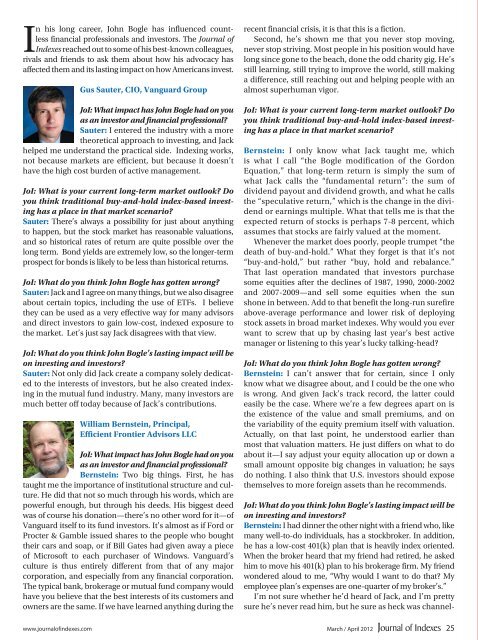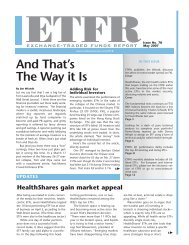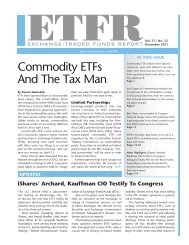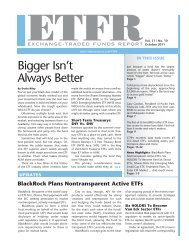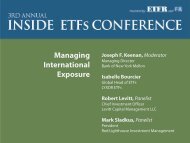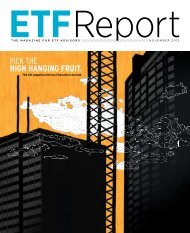Create successful ePaper yourself
Turn your PDF publications into a flip-book with our unique Google optimized e-Paper software.
In his long career, John Bogle has influenced countless<br />
financial professionals and investors. The Journal of<br />
Indexes reached out to some of his best-known colleagues,<br />
rivals and friends to ask <strong>the</strong>m about how his advocacy has<br />
affected <strong>the</strong>m and its lasting impact on how Americans invest.<br />
Gus Sauter, CIO, Vanguard Group<br />
JoI: What impact has John Bogle had on you<br />
as an investor and financial professional?<br />
Sauter: I entered <strong>the</strong> industry with a more<br />
<strong>the</strong>oretical approach to investing, and Jack<br />
helped me understand <strong>the</strong> practical side. Indexing works,<br />
not because markets are efficient, but because it doesn’t<br />
have <strong>the</strong> high cost burden of active management.<br />
JoI: What is your current long-term market outlook? Do<br />
you think traditional buy-and-hold index-based investing<br />
has a place in that market scenario?<br />
Sauter: There’s always a possibility for just about anything<br />
to happen, but <strong>the</strong> stock market has reasonable valuations,<br />
and so historical rates of return are quite possible over <strong>the</strong><br />
long term. Bond yields are extremely low, so <strong>the</strong> longer-term<br />
prospect for bonds is likely to be less than historical returns.<br />
JoI: What do you think John Bogle has gotten wrong?<br />
Sauter: Jack and I agree on many things, but we also disagree<br />
about certain topics, including <strong>the</strong> use of ETFs. I believe<br />
<strong>the</strong>y can be used as a very effective way for many advisors<br />
and direct investors to gain low-cost, indexed exposure to<br />
<strong>the</strong> market. Let’s just say Jack disagrees with that view.<br />
JoI: What do you think John Bogle’s lasting impact will be<br />
on investing and investors?<br />
Sauter: Not only did Jack create a <strong>com</strong>pany solely dedicated<br />
to <strong>the</strong> interests of investors, but he also created indexing<br />
in <strong>the</strong> mutual fund industry. Many, many investors are<br />
much better off today because of Jack’s contributions.<br />
William Bernstein, Principal,<br />
Efficient Frontier Advisors LLC<br />
JoI: What impact has John Bogle had on you<br />
as an investor and financial professional?<br />
Bernstein: Two big things. First, he has<br />
taught me <strong>the</strong> importance of institutional structure and culture.<br />
He did that not so much through his words, which are<br />
powerful enough, but through his deeds. His biggest deed<br />
was of course his donation—<strong>the</strong>re’s no o<strong>the</strong>r word for it—of<br />
Vanguard itself to its fund investors. It’s almost as if Ford or<br />
Procter & Gamble <strong>issue</strong>d shares to <strong>the</strong> people who bought<br />
<strong>the</strong>ir cars and soap, or if Bill Gates had given away a piece<br />
of Microsoft to each purchaser of Windows. Vanguard’s<br />
culture is thus entirely different from that of any major<br />
corporation, and especially from any financial corporation.<br />
The typical bank, brokerage or mutual fund <strong>com</strong>pany would<br />
have you believe that <strong>the</strong> best interests of its customers and<br />
owners are <strong>the</strong> same. If we have learned anything during <strong>the</strong><br />
recent financial crisis, it is that this is a fiction.<br />
Second, he’s shown me that you never stop moving,<br />
never stop striving. Most people in his position would have<br />
long since gone to <strong>the</strong> beach, done <strong>the</strong> odd charity gig. He’s<br />
still learning, still trying to improve <strong>the</strong> world, still making<br />
a difference, still reaching out and helping people with an<br />
almost superhuman vigor.<br />
JoI: What is your current long-term market outlook? Do<br />
you think traditional buy-and-hold index-based investing<br />
has a place in that market scenario?<br />
Bernstein: I only know what Jack taught me, which<br />
is what I call “<strong>the</strong> Bogle modification of <strong>the</strong> Gordon<br />
Equation,” that long-term return is simply <strong>the</strong> sum of<br />
what Jack calls <strong>the</strong> “fundamental return”: <strong>the</strong> sum of<br />
dividend payout and dividend growth, and what he calls<br />
<strong>the</strong> “speculative return,” which is <strong>the</strong> change in <strong>the</strong> dividend<br />
or earnings multiple. What that tells me is that <strong>the</strong><br />
expected return of stocks is perhaps 7-8 percent, which<br />
assumes that stocks are fairly valued at <strong>the</strong> moment.<br />
Whenever <strong>the</strong> market does poorly, people trumpet “<strong>the</strong><br />
death of buy-and-hold.” What <strong>the</strong>y forget is that it’s not<br />
“buy-and-hold,” but ra<strong>the</strong>r “buy, hold and rebalance.”<br />
That last operation mandated that investors purchase<br />
some equities after <strong>the</strong> declines of 1987, 1990, 2000-2002<br />
and 2007-2009—and sell some equities when <strong>the</strong> sun<br />
shone in between. Add to that benefit <strong>the</strong> long-run surefire<br />
above-average performance and lower risk of deploying<br />
stock assets in broad market indexes. Why would you ever<br />
want to screw that up by chasing last year’s best active<br />
manager or listening to this year’s lucky talking-head?<br />
JoI: What do you think John Bogle has gotten wrong?<br />
Bernstein: I can’t answer that for certain, since I only<br />
know what we disagree about, and I could be <strong>the</strong> one who<br />
is wrong. And given Jack’s track record, <strong>the</strong> latter could<br />
easily be <strong>the</strong> case. Where we’re a few degrees apart on is<br />
<strong>the</strong> existence of <strong>the</strong> value and small premiums, and on<br />
<strong>the</strong> variability of <strong>the</strong> equity premium itself with valuation.<br />
Actually, on that last point, he understood earlier than<br />
most that valuation matters. He just differs on what to do<br />
about it—I say adjust your equity allocation up or down a<br />
small amount opposite big changes in valuation; he says<br />
do nothing. I also think that U.S. investors should expose<br />
<strong>the</strong>mselves to more foreign assets than he re<strong>com</strong>mends.<br />
JoI: What do you think John Bogle’s lasting impact will be<br />
on investing and investors?<br />
Bernstein: I had dinner <strong>the</strong> o<strong>the</strong>r night with a friend who, like<br />
many well-to-do individuals, has a stockbroker. In addition,<br />
he has a low-cost 401(k) plan that is heavily index oriented.<br />
When <strong>the</strong> broker heard that my friend had retired, he asked<br />
him to move his 401(k) plan to his brokerage firm. My friend<br />
wondered aloud to me, “Why would I want to do that? My<br />
employee plan’s expenses are one-quarter of my broker’s.”<br />
I’m not sure whe<strong>the</strong>r he’d heard of Jack, and I’m pretty<br />
sure he’s never read him, but he sure as heck was channel-<br />
www.journalofindexes.<strong>com</strong> March / April 2012 25


